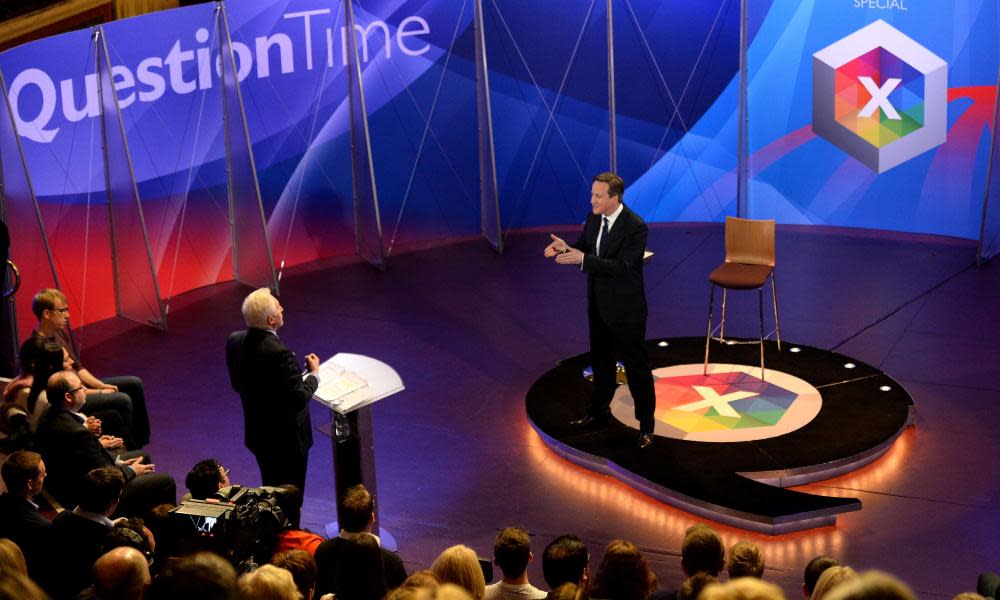Will a stellar turn with Paxman shift the polls? Ask Nick Clegg …

The sound and fury of campaign season returns this week after a lengthy pause to respect the victims of the Manchester terror attack. While Theresa May has successfully ducked calls for head-to-head leaders’ debates, the Conservative and Labour leaders will take turns on the stage at a pair of high-profile events – being grilled in turn by Jeremy Paxman on Monday, then taking turns to field questions from the public in a special edition of Question Time on Friday. These television set pieces are likely to dominate election discussions in the coming days. Whether they change any minds is another matter.
Many events can seem hugely consequential in the heat of an election campaign, but in most cases former Conservative prime minister Arthur Balfour’s dictum holds: “Nothing matters very much, and most things don’t matter at all.” Clashes between party leaders, whatever the format, are no exception. Most voters have well-established views of the parties and their leaders, and televised jousts seldom change these. Supporters and opponents alike see what they expect to see.
Both of this week’s events are likely to feature May reiterating her commitment to strong and stable government, and Jeremy Corbyn rehearsing familiar arguments on inequality and injustice. The most likely source of interest will be unusual or awkward questions from the public, and while these will often dominate a news cycle or two, they rarely have a lasting impact.
There are exceptions. Leaders’ set piece performances can sway undecided or conflicted voters and a strong leader’s performance can intensify the commitment of less-interested partisans. Getting such voters’ attention is hard. Televised leaders’ events attract committed partisans, whose minds are already made up, but don’t usually strike the majority of voters as an interesting viewing option. So to generate a meaningful impact, a leaders’ event needs to be exciting enough to engage interest beyond the tribal minority, and needs to occur when there are plenty of conflicted, bored or undecided voters available to be swayed.
The 2010 leaders’ debates are an example of what happens when these stars align. Many voters had lost faith in Gordon Brown and Labour following the financial crisis, but remained wary of a Conservative party they worried would impose harsh cuts on public services. These conflicted voters were looking for another option – a way to vote out a Labour prime minister they disliked without giving too strong a mandate to a party they did not fully trust. This was the volatile electoral context for the first televised head-to-head debates featuring the leaders of the three largest political parties – events that through sheer novelty value alone were sure to attract huge media coverage and large audiences.
It was at these events that voters discovered a solution: Nick Clegg. The arguments Clegg used – that both of the traditional parties had failed and it was time for a fresh start with someone new – spoke directly to conflicted voters’ concerns, as did the prospect of the Lib Dems restraining the bigger parties’ worst instincts.
Brown and David Cameron had both become aware of the potential threat from Clegg during debate rehearsals, when the aides playing the Lib Dem leader had proved easily the most persuasive. Yet neither had an effective counter to the prospect of a fresh start and a different approach to government. After the debates, Clegg’s personal ratings soared to stratospheric heights (one poll rated him more popular than Churchill at the end of the second world war) and the Lib Dems’ poll ratings rose with them.
Could something similar happen this week? Many voters are conflicted once again – the botched Conservative manifesto launch and swift reversal on the “dementia tax” severely dented May’s personal ratings, yet most voters also remain unconvinced by Corbyn. Manchester, and the sharp tightening in the most recent polls, may bring more eyes to the screens, with the stakes now higher and the outcome more in doubt. These could be the conditions in which an exceptional, or awful, leader performance changes the shape of the race.
So there is much to play for. Yet the outcome in 2010 offers reason for caution. The Lib Dem polling surge that upended the campaign proved to be a mirage: their vote share rose only one point, and the party suffered a net loss of seats. Clegg’s star turn did not, in the end, matter very much. Balfour would doubtless have smiled at that.
Robert Ford is professor of political science at the University of Manchester and the author, with Matthew Goodwin, of Revolt on the Right: Explaining Support for the Radical Right in Britain

 Yahoo News
Yahoo News 
